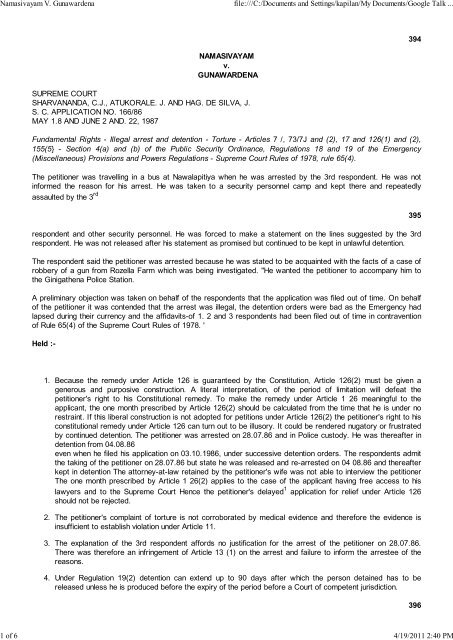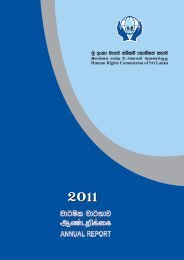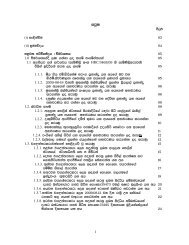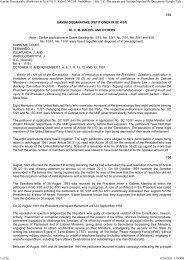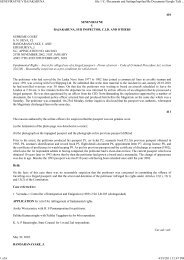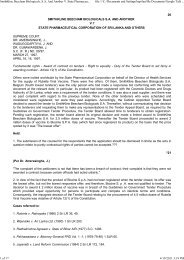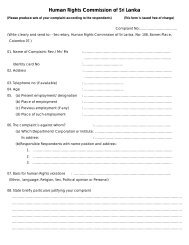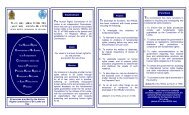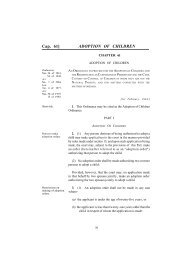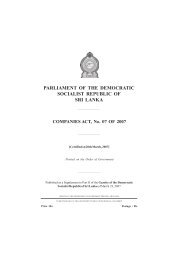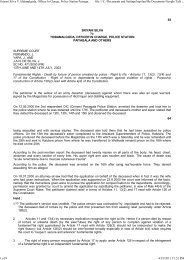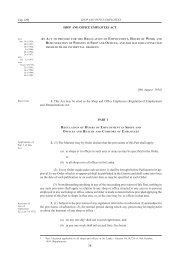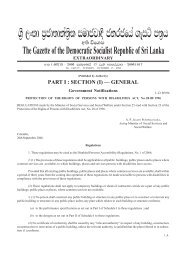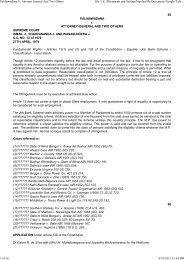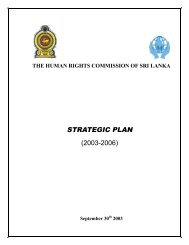Namasivayam V. Gunawardena
Namasivayam V. Gunawardena
Namasivayam V. Gunawardena
You also want an ePaper? Increase the reach of your titles
YUMPU automatically turns print PDFs into web optimized ePapers that Google loves.
<strong>Namasivayam</strong> V. <strong>Gunawardena</strong> file:///C:/Documents and Settings/kapilan/My Documents/Google Talk ...<br />
NAMASIVAYAM<br />
v.<br />
GUNAWARDENA<br />
SUPREME COURT<br />
SHARVANANDA, C.J., ATUKORALE. J. AND HAG. DE SILVA, J.<br />
S. C. APPLICATION NO. 166/86<br />
MAY 1.8 AND JUNE 2 AND. 22, 1987<br />
Fundamental Rights - Illegal arrest and detention - Torture - Articles 7 /, 73/7J and (2), 17 and 126(1) and (2),<br />
155(5} - Section 4(a) and (b) of the Public Security Ordinance, Regulations 18 and 19 of the Emergency<br />
(Miscellaneous) Provisions and Powers Regulations - Supreme Court Rules of 1978, rule 65(4).<br />
The petitioner was travelling in a bus at Nawalapitiya when he was arrested by the 3rd respondent. He was not<br />
informed the reason for his arrest. He was taken to a security personnel camp and kept there and repeatedly<br />
assaulted by the 3 rd<br />
respondent and other security personnel. He was forced to make a statement on the lines suggested by the 3rd<br />
respondent. He was not released after his statement as promised but continued to be kept in unlawful detention.<br />
The respondent said the petitioner was arrested because he was stated to be acquainted with the facts of a case of<br />
robbery of a gun from Rozella Farm which was being investigated. "He wanted the petitioner to accompany him to<br />
the Ginigathena Police Station.<br />
A preliminary objection was taken on behalf of the respondents that the application was filed out of time. On behalf<br />
of the petitioner it was contended that the arrest was illegal, the detention orders were bad as the Emergency had<br />
lapsed during their currency and the affidavits-of 1. 2 and 3 respondents had been filed out of time in contravention<br />
of Rule 65(4) of the Supreme Court Rules of 1978. '<br />
Held :-<br />
1.<br />
2.<br />
3.<br />
4.<br />
Because the remedy under Article 126 is guaranteed by the Constitution, Article 126(2) must be given a<br />
generous and purposive construction. A literal interpretation, of the period of limitation will defeat the<br />
petitioner's right to his Constitutional remedy. To make the remedy under Article 1 26 meaningful to the<br />
applicant, the one month prescribed by Article 126(2) should be calculated from the time that he is under no<br />
restraint. If this liberal construction is not adopted for petitions under Article 126(2) the petitioner's right to his<br />
constitutional remedy under Article 126 can turn out to be illusory. It could be rendered nugatory or frustrated<br />
by continued detention. The petitioner was arrested on 28.07.86 and in Police custody. He was thereafter in<br />
detention from 04.08.86<br />
even when he filed his application on 03.10.1986, under successive detention orders. The respondents admit<br />
the taking of the petitioner on 28.07.86 but state he was released and re-arrested on 04 08.86 and thereafter<br />
kept in detention The attorney-at-law retained by the petitioner's wife was not able to interview the petitioner<br />
The one month prescribed by Article 1 26(2) applies to the case of the applicant having free access to his<br />
lawyers and to the Supreme Court Hence the petitioner's delayed 1 application for relief under Article 126<br />
should not be rejected.<br />
The petitioner's complaint of torture is not corroborated by medical evidence and therefore the evidence is<br />
insufficient to establish violation under Article 11.<br />
The explanation of the 3rd respondent affords no justification for the arrest of the petitioner on 28.07.86.<br />
There was therefore an infringement of Article 13 (1) on the arrest and failure to inform the arrestee of the<br />
reasons.<br />
Under Regulation 19(2) detention can extend up to 90 days after which the person detained has to be<br />
released unless he is produced before the expiry of the period before a Court of competent jurisdiction.<br />
1 of 6 4/19/2011 2:40 PM<br />
394<br />
395<br />
396
<strong>Namasivayam</strong> V. <strong>Gunawardena</strong> file:///C:/Documents and Settings/kapilan/My Documents/Google Talk ...<br />
(5) Under Regulation 19(2), Article 1 55(5) and section 4{a) & (b) of the Public Security Ordinance read together, the<br />
validity of a detention order made under a Regulation since lapsed is kept alive. The expiry of the Emergency<br />
Regulations does not affect the detention order under which the petitioner was held.<br />
(6), The 1.2.3 respondents filed their objections after the 7 days from date of service of a notice as stipulated by<br />
Rule 65(4) of-.the Supreme Court Rules 1978 but the Chief Justice had granted them an extension on an application<br />
made by them.<br />
The Chief Justice here exercised a discretion founded on the inherent right of the Supreme Court to do justice As a<br />
matter of administrative arrangement the Chief Justice deals with applications for extended time Affidavits and<br />
objections filed within such extended time could be admitted.<br />
Application for infringement of Fundamental Rights under Articles 11, 13(1) and (2),<br />
Jayampathy Wickremaratne with M. S. M. Suhaid, M. H M Salman and Hemasiri Withanachchi for Petitioner.<br />
Nihal jayasinghe SSC for Attorney‑General.<br />
Petitioner present in person produced from Remand Prison.<br />
September 9, 1987<br />
SHARVANANDA, C.J.<br />
Cur. adv. vult<br />
By his petition dated 3 rd October 1986 the Petitioner complained to this Court that the fundamental rights<br />
guaranteed to him by Articles 11, 13 (1) and 13(2) had been violated by the Respondents.<br />
In this petition, the Petitioner has stated that: on 28.7.86 while he was travelling in a C.T.B. bus on his way<br />
to Nawalapitiya, he was arrested by Police Sgt. Najibdeen, the 3 rd Respondent; he was not informed the reason for<br />
his arrest, he was taken to a security personnel camp and kept there till 4 th August 1986 and during this period he<br />
was repeatedly assaulted by the 3 rd Respondent and other security personnel. He was told that he was a terrorist<br />
belonging to an organisation which they referred to as T.E.L.E. or Tamil Eelam Liberation Extremists; though he<br />
denied the allegation they continued to assault him until he<br />
agreed to make a statement on the lines suggested by the 3 rd Respondent. On 4.8.86 he was taken to the Police<br />
Station Hatton and produced before the 2 nd Respondent who was the Head Quarters Inspector of the Hatton Police;<br />
as he was unable to withstand any more physical assault and as he was promised that he would be released, he<br />
made a statement to the 2 nd Respondent on the lines suggested by the 3 rd Respondent. He was not released after<br />
his statement as promised; he was continued to be kept in unlawful detention. On 31.8.86 he was taken to the<br />
Gampola Police Station and kept there till 5.9.86. At Gampola Police he was compelled by threats to repeat to the<br />
A.S.P., Gampola the statement, that he had made earlier to the 2 nd Respondent. He made the statement because<br />
he feared that he would be subjected to assault by the 3 rd Respondent and other officers. On 5.9.86 he was taken<br />
back to Hatton Police Station and kept till 18.9.86. On 18.9.86 he was taken to the Hatton Magistrate and was<br />
remanded by him indefinitely.<br />
The Petitioner further complained that the Attorney‑at‑Law arranged by his wife to interview him was denied<br />
access to him by the 2 nd Respondent.<br />
The Respondents by their affidavits have denied the allegations made against them by the Petitioner. Police<br />
Sgt. Najimudeen, 3 rd Respondent, denied having arrested the petitioner on 28.7.86. He has stated that "on 28.7.86, I<br />
was investigating into a case of robbery of gun from Rosella Farm committed on 3.6.86. I had reason to believe that<br />
the Petitioner was acquainted with the facts and circumstances relating to the said robbery. I requested the<br />
Petitioner to accompany me to Ginigathena Police for questioning. At the Police Station he was questioned in<br />
connection with this case and was released immediately after his statement was recorded." The 3 rd Respondent<br />
further stated that subsequently he received information that the Petitioner was involved in acts which constituted<br />
2 of 6 4/19/2011 2:40 PM<br />
397
<strong>Namasivayam</strong> V. <strong>Gunawardena</strong> file:///C:/Documents and Settings/kapilan/My Documents/Google Talk ...<br />
offences under the Emergency (Miscellaneous) Provisions & Powers Regulations and that on 4.8.86, he arrested the<br />
Petitioner in terms of Regulation 18 at the Watawala Railway Station, that after having explained the charge against<br />
him he took the Petitioner to the Hatton Police Station, where he was questioned on the information he, had;<br />
that the Petitioner made a statement to the 2 nd Respondent in which he admitted that he was a member of the Tamil<br />
Eelam Liberation Extremists. The 3 rd Respondent has denied having made any inducement, threat or suggestion to<br />
the Petitioner to make the statement.<br />
The 3 rd Respondent further stated that on 5.8.86 the 1 st Respondent who is the Deputy Inspector General of<br />
Police, Kandy, made order authorising the detention of the Petitioner at the Hatton Police Station for 30 days from<br />
5.8.86, that the Petitioner was detained at the Hatton Police Station till 31 st August 1986 on which date he was taken<br />
to the Gampola Police Station, for the purpose of recording a statement by the A. S. P., Gampola. Recording of the<br />
statement continued from 31 .8.86 till 5.9.86. The Petitioner was taken back to Hatton Police Station on 5.9.86 and<br />
was produced before the Magistrate on 18.9.86 and was remanded by the Magistrate. The 3 rd Respondent denied<br />
having told Mr. Wickremaratne, Attorney‑at‑Law that he had instructions from the 2 nd Respondent not to permit any<br />
person to speak to the Petitioner. As the 2 nd Respondent was away at the time when Mr. Wickremaratne came to<br />
the Hatton Police Station, the Probationary Sub‑Inspector had asked him to obtain permission from the A.S.P.,<br />
Hatton to speak to the Petitioner. As Mr. Wickremaratne was unable to meet the A.S.P. he went away.<br />
The 1 st Respondent who is the Deputy Inspector General of Police, (Central Range) has filed affidavit<br />
stating that on 5.8.86 it was brought to his notice that the Petitioner had been arrested on suspicion of having<br />
committed an offence under the Emergency Regulations. He made order on 5.8.86 authorising the Hatton Police<br />
Station to be the place where the Petitioner should be detained till 4.9.86, and that subsequently on 4.9.86 he again<br />
made order that the Petitioner be kept at that place till 4.10.86.<br />
The 2 nd Respondent who is the Headquarters Inspector, Hatton Police Station has stated that on 4.8.86<br />
Petitioner was brought before him at the Hatton Police Station, that he voluntarily made a statement to him, wherein<br />
he admitted his involvement in the activities of the T.E.L.E., that the Petitioner was<br />
refused permission to the Attorney-at-Law to speak to the Petitioner.<br />
At the outset of the hearing Counsel for the Attorney-General raised a preliminary objection that the petition under<br />
Article 1 26 of the Constitution was filed out of time.<br />
Article 1 26 provides that an application to the Supreme Court praying for relief in respect of any infringement by<br />
executive or administrative action should be filed within one month of the alleged infringement. According to the<br />
Petitioner, he was unlawfully arrested on 28.7.86 and was in breach of Article 13(1) of the Constitution, not made<br />
aware of the reason for his arrest, and was unlawfully detained from that date.<br />
In my view, Article 1 26(2) postulates a person whose freedom of movement is not fettered by being kept in custody<br />
or detention, who has free access to the Supreme Court to apply for relief under Article 126 of the Constitution.<br />
According to the Petitioner from the date of his arrest on 28.7.86 to the time of the filing of the petition on 3.10.86 he<br />
was in detention. And hence he did not have free access to the Supreme Court or to his lawyer to be able to take<br />
proceedings within the one month stipulated by Article 126(2). Admittedly the Petitioner was in detention from 4.8.86<br />
to the date of his filing the present application.<br />
Counsel stated that even though he was not in a position to make his application, his wife could have, on his behalf,<br />
made the application within the time. According to the' Petitioner his wife was strictly enjoined by the Police not<br />
to-discuss with the Petitioner any matter pertaining to the detention and that he was not able to discuss anything with<br />
his wife, relating to his detention or arrest because of the presence of a Police Officer whenever his wife visited him.<br />
Further Mr. Wickremaratne,<br />
3 of 6 4/19/2011 2:40 PM<br />
398<br />
399
<strong>Namasivayam</strong> V. <strong>Gunawardena</strong> file:///C:/Documents and Settings/kapilan/My Documents/Google Talk ...<br />
Attorney-at-Law who was appointed by Petitioner's wife to interview the Petitioner was not able to have any<br />
conference with the Petitioner. In any event the Petitioner cannot suffer for the failure of his wife to take steps under<br />
Article 126 It cannot be gainsaid that his detention prevented him from taking proceedings within one month<br />
prescribed by Article 126. To make the remedy under Article 1 26 meaningful to the applicant, the one month<br />
prescribed by Article 1 26(2) should be calculated from the time that he is under no restraint. If this liberal<br />
construction is not adopted for Petitions under Article 1 26(2) the Petitioner's right to his constitutional remedy under<br />
Article 126 can turn out to be illusory. It could be rendered nugatory or frustrated by continued detention. According<br />
to the facts in this case, the Petitioner was unlawfully arrested, and was not informed of the reason for his arrest on<br />
28.7.86. The Respondents admit that the Petitioner has been in detention from 4\8.86 and continued to be in<br />
detention even on 3.10.1986 when he filed the present application. The Respondents admit the incident of 28.7:86,<br />
but state that he was re-arrested on 4.8.86 and thereafter kept in detention. Admittedly the Attorney-at-Law retained<br />
by Petitioner's wife was not able to interview the Petitioner, in the circumstances, the Petitioner was thwarted from<br />
filing his petition under Article 1 26, within one month in terms of that Article. A literal interpretation of the period of<br />
limitation will defeat the Petitioner's right to his constitutional remedy. It is significant that Article 1 7 which provides<br />
that every person shall be entitled to apply to the Supreme Court as provided by Article 1 26 in respect of the<br />
infringement by executive or administrative action of his fundamental right, is itself included in the Chapter on<br />
fundamental rights. Because the remedy under Article 126 is thus guaranteed by the Constitution, a duty is imposed<br />
upon the Supreme Court to protect fundamental rights and ensure their vindication. Hence Article 126(2) should be<br />
given a generous and purposive construction. The one month prescribed by Article 126(2) for making an application<br />
for relief by a person for infraction of his fundamental right applies to the case of the applicant having free access to<br />
his lawyer and to the Supreme Court. Hence, if the Petitioner was obstructed by reason of his detention from having<br />
access to his lawyer and to the Supreme Court and thus prevented from making his application within the<br />
one month of the infraction complained of; his delayed application for relief under Article 1 26 should not be ruled out,<br />
if he made his application as soon as he was free from that constraint to make the application.<br />
We therefore overruled the preliminary objection raised by State Counsel.<br />
On the question whether the petitioner was subject to cruel treatment or torture, petitioner's averments stands<br />
uncorroborated by any medical evidence and has been denied by the Respondents. The evidence is not sufficient for<br />
us to hold that there had been any violation of Article 11 of the Constitution.<br />
The Petitioner states that he was arrested on 28.7.86 when he was travelling in a bus, by the 3rd Respondent and<br />
that he was not informed of the reason of the arrest. The 3rd Respondent in his affidavit admitted the incident but<br />
stated that he did not arrest the petitioner. According to him he only required the petitioner to accompany him to the<br />
Ginigathena Police Station for questioning and released him after recording the statement at the station. If his action<br />
constituted an arrest in the legal sense, implicit in the 3rd Respondent's explanation is the admission that he did not<br />
give any reason to the Petitioner for his arrest. In my view when the 3rd Respondent required the Petitioner to<br />
accompany him to the Police Station and took him to the Police Station, the Petitioner was in law arrested by the 3rd<br />
Respondent. The Petitioner was prevented by the action of the 3rd Respondent from proceeding with his journey in<br />
the bus. The Petitioner was deprived of his liberty to go where he pleased. It was not necessary that there should<br />
have been any actual use of force; threat of force used to procure the Petitioner's submission was sufficient. The<br />
Petitioner did hot go to the Police Station Voluntarily. He was taken to the Police by the 3rd Respondent, in my view<br />
the 3rd Respondent's action of arresting the Petitioner and not informing him the reasons for his arrest violated the<br />
Petitioner's fundamental rights warranted by Article 1 3(1) of the Constitution. The liberty of an individual is a matter<br />
of great constitutional importance. This liberty should not be interfered<br />
with, whatever the status of that individual be, arbitrarily or without legal justification. The 3rd Respondent does not<br />
plead that he had any reasonable suspicion that the Petitioner had committed any cognizable offence when he<br />
arrested the petitioner on 28.7.86. In his affidavit he states that since he had reason to believe that the Petitioner<br />
was acquainted with the facts and circumstances relating to the robbery of a gun at Rozella Farm, Rozella, he<br />
required the Petitioner to accompany him to the Ginigathena Police Station. In my view the explanation of the 3rd<br />
Respondent affords no justification for his arrest of the petitioner on that date.<br />
On the question of the legality of the detention complained of the Respondents state that they took action under<br />
Emergency Regulations and were holding the Petitioner in detention from 4.8.86 until the Magistrate made order<br />
remanding the Petitioner to fiscal custody. They state that they had a reasonable suspicion that the petitioner was<br />
involved in the activities of the T.E.L.E. Though the Respondents have not placed before this Court any material to<br />
4 of 6 4/19/2011 2:40 PM<br />
400<br />
401<br />
402
<strong>Namasivayam</strong> V. <strong>Gunawardena</strong> file:///C:/Documents and Settings/kapilan/My Documents/Google Talk ...<br />
justify their suspicion, yet it cannot be said that in the conditions prevailing in the; country their suspicion was not<br />
reasonable.<br />
Counsel for the Petitioner submitted that the detention order 'A' made on 5.8.1986 under the Emergency Regulations<br />
dated 18.7.86 was valid only upto 18.8.86. The said regulations were in operation for a period of one month from the<br />
date of the making thereof and hence were' valid only till 18.8.86. He submitted that a new detention order had to be<br />
made in terms of the new set of regulations to lend validity to the detention of the petitioner. Regulation 19(2)<br />
provides that a person detained in pursuance of the provisions of regulation 18 ... may be so detained for a period<br />
not exceeding ninety days reckoned from date of his arrest under the regulation and shall at the end of the period be<br />
released by the officer in charge of that place unless such person has been produced by such officer before the<br />
expiry of that period before a Court of competent jurisdiction.<br />
Article 155(5) of the Constitution provides that-<br />
"Where the provisions of nay law relating to public security have been brought into operation by the making of<br />
a Proclamation under such law, (the Public Security Ordinance) such Proclamation shall, subject to<br />
the provisions of Article 155(6), be in operation for a period of one month from the date of the<br />
making thereof, but without prejudice to the earlier revocation of such. Proclamation or to the making<br />
of a further Proclamation at or before the end of the period."<br />
Section 4 of the Public Security Ordinance provides, inter alia, that ‑<br />
"the expiry of revocation of any Proclamation under section 2 of the Public Security<br />
Ordinance shall not affect or be deemed to have affected ‑<br />
(a) the past operation of any thing duly done or suffered to be done under Part II of the<br />
Ordinance, while that Part was in operation;<br />
(b) any offence committed, or any right, liberty or penalty<br />
acquired or incurred while that Part was in operation."<br />
This liability to be detained for a period of, ninety days was the penalty incurred by the Petitioner under the<br />
Emergency Regulations current between 18.7.86 and 18.8.86: The expiry of the said Regulations does not therefore<br />
affect the detention order under which the Petitioner was held. In view of the aforesaid provisions of the law I do not<br />
agree with the apparently plausible submission of Counsel, that the detention order cannot survive the emergency<br />
regulation under which it was made.<br />
Counsel for the Petitioner objected to the admission of the reception of the affidavits filed by the<br />
Respondents on the ground that they were not filed within time specified by Rule 65(4) (2) of the Supreme Court<br />
Rules of 1978. Counsel pointed to the mandatory nature of the Rule and urged that an affidavit or objection filed<br />
outside the time stipulated by the Rule is not in compliance with the Rule and should not be admitted.<br />
The aforesaid Rule 65(4) provides‑<br />
"Upon leave being granted a notice of the application together with a copy of the written<br />
submissions shall be given forthwith by the Registrar to each of the Respondents other than the<br />
Attorney‑General, and each such Respondent may, within seven days of the service of such notice<br />
and written submissions, file counter‑affidavit and counter‑submissions with notice to the Petitioner.<br />
Any further written submissions by any part shall be permitted only at the discretion of the Court."<br />
In this case notice of the Petitioner's application was served on the Respondents on or about the 24.10.86.<br />
The Attorney General on 30.10.86 filed proxy and moved for time to file objections. But the other Respondents' did<br />
not file proxy or did not ask for time to file objections, within the seven days of the service of the notice on them. On<br />
7.11.86, the Attorney‑at‑law for the 1 st , 2 nd and 3 rd Respondents filed his proxy and moved "as it was .not possible<br />
for the 1 st , 2 nd and 3 rd Respondents to obtain necessary material to prepare and file counter affidavits, I respectfully<br />
move that this Court be pleased to grant further 2 weeks time to file counter affidavit." The Chief Justice acceded to<br />
the request of the Respondents and granted further time to file counter affidavits.<br />
I agree With the Counsel for the Petitioners that if the Respondent did not file their affidavits and written<br />
submissions within the time specified by the above Regulation, they are not entitled to claim that their affidavits and<br />
5 of 6 4/19/2011 2:40 PM<br />
403<br />
404
<strong>Namasivayam</strong> V. <strong>Gunawardena</strong> file:///C:/Documents and Settings/kapilan/My Documents/Google Talk ...<br />
written submissions should be taken into account. But it does not follow that this Court has no discretion to grant<br />
further time on being satisfied that the Respondents would not be able or were not able to collect the necessary data<br />
or material for such affidavits or written submissions on an application made to it by the Respondents. That<br />
discretion, is founded on the inherent right of this Court to do justice. As a matter of administrative arrangement the<br />
Chief Justice of this Court deals with such applications and grants extended time, if circumstances warranted grant<br />
of further time within which to file objections. Affidavits and objections filed within such extended time could be<br />
admitted. Since in the exercise of the discretion, this Court<br />
had granted further time to the Respondents to file affidavits or submissions, and the Respondents have, within the<br />
time so allowed, filed their affidavits, the objection of the counsel for the Petitioner against their admission cannot be<br />
upheld.<br />
Though I hold that the Petitioner has not established that his fundamental rights, assured to him by Article 11 and<br />
13(2) have been violated by the Respondents. I hold that since the 3 rd Respondent had unlawfully arrested the<br />
Petitioner on 28.7.86 and failed to inform the Petitioner the reason for his arrest, the 3 rd Respondent had violated<br />
Petitioner's fundamental rights, assured, to him by Article 13(1). In the exercise of the powers under Article 126(4) of<br />
the Constitution, I order the State, represented in these proceedings by the Attorney-General to pay the Petitioner<br />
Rs. 3000/- as compensation for such, violation.<br />
The Petitioner's application is allowed to the extent indicated above. In the circumstances of the case, parties will<br />
bear their<br />
own costs. '<br />
ATUKORALE, J. - I agree<br />
H. A. G. DE SILVA, J, - I agree<br />
Article 13(1) infringement.<br />
6 of 6 4/19/2011 2:40 PM<br />
405


